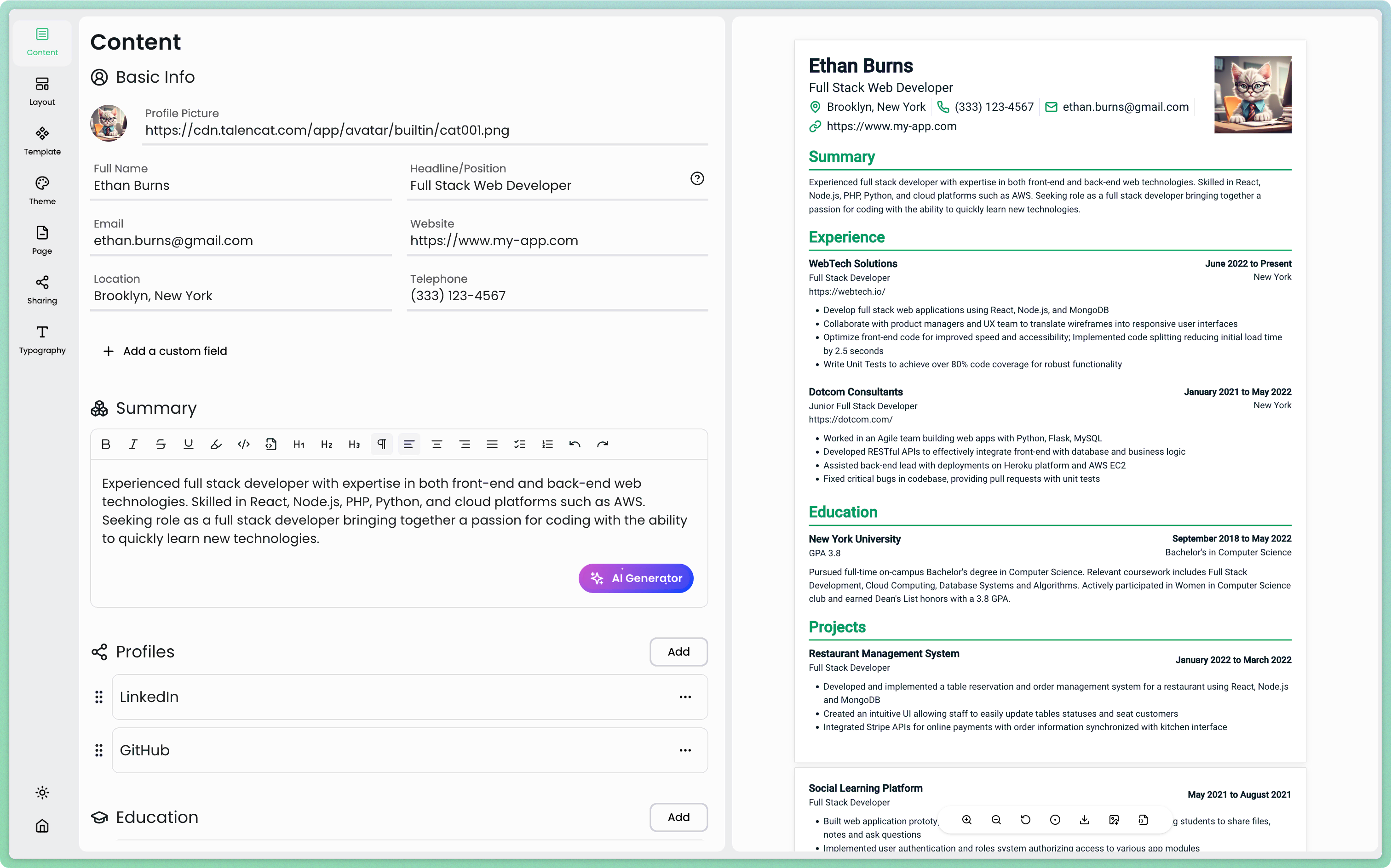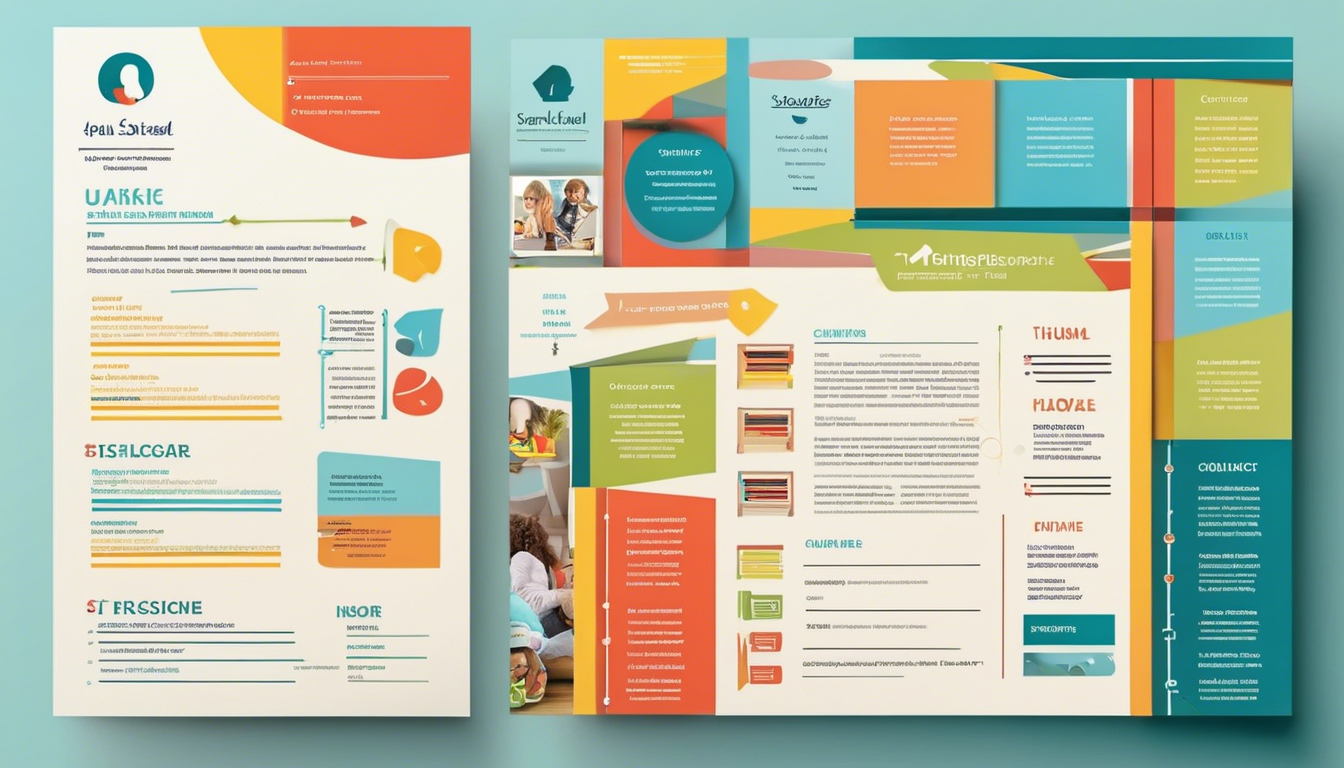In recent years, DevOps engineers have become more crucial in modern software development and IT operations. If you want to become a DevOps engineer, a professional resume will help you open the door.
In this article, you will learn what content you should include in your DevOps engineer resume and how to organize it to build a professional one. Also, you will get some proven examples of DevOps engineer resumes to help you easily get your resume-building started.
Key Takeaways
-
Understanding the core responsibilities of a DevOps engineer, such as implementing CI/CD pipelines, managing cloud infrastructure, and optimizing system performance.
-
Developing a diverse skill set that includes programming, cloud platforms, containerization, and automation tools.
-
Crafting a resume that highlights relevant technical skills, work experience, projects, and certifications.
-
Following best practices in resume writing, such as using active voice, quantifying achievements, and tailoring content to specific job descriptions.
-
Utilizing tools like TalenCat CV Maker to streamline the resume creation process and ensure a professional presentation.
-
Referencing proven resume examples to guide the structure and content of your own DevOps engineer resume.

Introduction to the DevOps Engineer Job
A DevOps Engineer plays a crucial role in modern software development and IT operations.

What is A DevOps Engineer
A DevOps Engineer bridges the gap between software development (Dev) and IT operations (Ops), aiming to shorten the systems development life cycle while delivering features, fixes, and updates frequently in close alignment with business objectives.

Key Responsibilities of DevOps Engineer
- Continuous Integration/Continuous Deployment (CI/CD):
- Implement and manage CI/CD pipelines
- Automate build, test, and deployment processes
- Infrastructure as Code (IaC):
- Use tools like Terraform, Ansible, or CloudFormation to manage infrastructure
- Version control infrastructure configurations
- Cloud Computing:
- Manage cloud services (AWS, Azure, GCP)
- Optimize cloud resource usage and costs
- Containerization and Orchestration:
- Work with Docker for containerization
- Manage container orchestration platforms like Kubernetes
- Monitoring and Logging:
- Implement monitoring solutions (e.g., Prometheus, Grafana)
- Set up centralized logging systems (e.g., ELK stack)
- Security:
- Implement security best practices in the CI/CD pipeline
- Conduct security audits and vulnerability assessments
- Collaboration:
- Foster communication between development, operations, and other teams
- Participate in cross-functional projects
- Performance Optimization:
- Identify and resolve bottlenecks in development and deployment processes
- Optimize application and infrastructure performance
Skills Requirements of DevOps Engineers
From the above responsibilities, we can easily summarize what skills and knowledge a DevOps Engineer needs to have. The necessary skills and knowledge for a DevOps Engineer are as follows:
- Programming: Proficiency in scripting languages (e.g., Python, Bash)
- Version Control: Git and related platforms (GitHub, GitLab)
- Operating Systems: Linux/Unix administration
- Networking: Understanding of TCP/IP, DNS, load balancing
- Databases: Knowledge of both SQL and NoSQL databases
- Cloud Platforms: AWS, Azure, or GCP certifications are often valuable
- Configuration Management: Tools like Ansible, Puppet, or Chef
- Containerization: Docker and container orchestration (Kubernetes)
- CI/CD Tools: Jenkins, GitLab CI, CircleCI, etc.
- Monitoring and Logging: ELK stack, Prometheus, Grafana
- Security: Understanding of cybersecurity principles and tools
How to Write DevOps Engineer Resumes
If you are going to apply for a DevOps engineer position, writing a professional resume for it could be very confusing. In this part, you will learn the key elements of a DevOps engineer resume and a brief guide for each element.
Key Elements Of A DevOps Engineer Resume
To write an effective DevOps Engineer resume, focus on these key elements:
- Strong summary/objective statement
- Relevant technical skills
- Work experience highlighting DevOps achievements
- Education and certifications
- Projects demonstrating practical skills
For each resume element, you should highlight your relevant experiences and skills. And remember, you need to keep your resume concise (1-2 pages) and tailor it to the specific job description.
Writing Guide for Each Element
Here is a brief guide on how to write the main elements of a DevOps engineer resume:
- DevOps Engineer Resume Summary: Concisely state your DevOps engineer experience, key skills, and career goals.
- Technical Skills: List relevant technologies like:
- CI/CD tools (Jenkins, GitLab CI, etc.)
- Infrastructure as Code (Terraform, Ansible, etc.)
- Cloud platforms (AWS, Azure, GCP)
- Containerization (Docker, Kubernetes)
- Scripting languages (Python, Bash, etc.)
- Monitoring tools (Prometheus, ELK stack, etc.)
- Work Experience:
- Focus on DevOps-related roles and responsibilities
- Use action verbs and quantify achievements
- Highlight automation, optimization, and scalability projects
- Education/Certifications:
- List relevant degrees
- Include DevOps-related certifications (e.g., AWS, Azure, Kubernetes)
- Projects:
- Describe personal or professional projects showcasing DevOps skills
- Mention tools used and outcomes achieved
DevOps Engineer Resume Writing Tips
Here are some key writing tips for crafting an effective DevOps Engineer resume. Keeping these tips in mind when building your resume, you can make your resume stand out among others.
- Use active voice: Begin bullet points with strong action verbs like "Implemented," "Optimized," or "Automated" to emphasize your direct impact.
- Quantify achievements: Include specific metrics where possible, e.g., "Reduced deployment time by 40%" or "Improved system uptime to 99.9%."
- Be concise: Use brief, impactful statements rather than long sentences. Aim for 3-5 bullet points per role.
- Tailor content: Customize your resume for each job application, highlighting skills and experiences most relevant to the specific position.
- Use industry keywords: Incorporate relevant DevOps terms and technologies, especially those mentioned in the job description.
- Avoid jargon: While using technical terms, ensure your resume is still understandable to non-technical recruiters.
- Proofread carefully: Eliminate all spelling and grammatical errors. A flawless resume demonstrates attention to detail.
- Use consistent formatting: Maintain a clean, professional layout with consistent font sizes and styles throughout.
- Focus on results: Emphasize outcomes and business impact rather than just listing job duties.
- Keep it current: Highlight recent projects and up-to-date skills, especially in the fast-evolving DevOps field.
Easily Build DevOps Engineer Resume With TalenCat
If you want to build a professional DevOps engineer resume, TalenCat CV Maker is the best option for you. TalenCat CV Maker is an AI-powered resume editor that provides a wide variety of built-in resume modules to maximize the customization of your DevOps engineer resume.
With TalenCat CV Maker, you can build your resume with various content modules:
- Basic Information
- Self-Summary
- Profile
- Education Information
- Work Experience
- Project Experience
- Languages
- Awards
- Interests
- Volunteer Experience

Also, you can add a "custom section" to include more unique content. In each section, you can utilize generative AI to help you improve the efficiency and quality of content.
Step-by-step Tutorial to Build A DevOps Engineer Resume
Let's start to build a DevOps engineer resume with just several steps.
Step 1. Log in to TalenCat CV Maker, and click the "+ Create Resume" button in the top right corner to create a new resume.

Step 2. Then, you need to name this resume and click the "Create" or "Create with Example" button. Here, you can name your resume "DevOps Engineer."

- Create: You can start your creation with a completely blank resume, and you need to fill in everything for your resume.
- Create with Example: You can start resume creating with a ready-to-use resume, you can change any content if it doesn't match you.
Step 3. You will enter a reactive CV editor, fill in your detailed information, and any content you enter will be immediately displayed in the right panel to give you an overview of your resume.

Once you have created or edited your resume, you can easily export it as a PDF file or picture.
Also, you can turn on the "online share" feature to get an online link to your resume. Then, you can easily share your resume with others using this link.

3 Examples of DevOps Engineer Resume
If you want to build your DevOps engineer resume more effectively, referring to proven examples is always the right solution. Here are 3 proven examples of DevOps engineer resumes.
Here are three DevOps Engineer resume examples for "TalenCat", presented in markdown format with quotation marks:
Example 1 (Entry-level)
TalenCat
DevOps Engineer
Summary:
Motivated junior DevOps Engineer with a strong foundation in cloud technologies and automation. Seeking to leverage my skills in CI/CD, containerization, and infrastructure as code to contribute to a dynamic DevOps team.
Technical Skills:CI/CD: Jenkins, GitLab CIIaC: Terraform, AnsibleCloud: AWS (Certified Cloud Practitioner)Containerization: Docker, basic KubernetesScripting: Python, BashVersion Control: Git
Education:
B.S. in Computer Science, Tech University, 2023
Projects:Automated deployment pipeline: Implemented a CI/CD pipeline using Jenkins and Docker for a personal web application, reducing deployment time by 70%.Infrastructure as Code: Created Terraform scripts to provision and manage AWS resources for a scalable web hosting environment.
Certifications:AWS Certified Cloud PractitionerJenkins Essentials
Example 2 (Mid-level)
TalenCat
Senior DevOps Engineer
Summary:
Results-driven DevOps Engineer with 5 years of experience optimizing software development lifecycles. Expertise in cloud infrastructure, CI/CD pipelines, and containerization technologies.
Technical Skills:CI/CD: Jenkins, GitLab CI, CircleCIIaC: Terraform, Ansible, CloudFormationCloud: AWS, AzureContainerization: Docker, KubernetesMonitoring: Prometheus, Grafana, ELK stackScripting: Python, Bash, Go
Professional Experience:
Senior DevOps Engineer, TechCorp Inc. (2020-Present)Led migration of legacy applications to microservices architecture, improving scalability by 200%Implemented GitOps workflow with ArgoCD, reducing deployment errors by 60%Designed and maintained Kubernetes clusters on AWS EKS, achieving 99.99% uptime
DevOps Engineer, StartupXYZ (2018-2020)Automated infrastructure provisioning with Terraform, cutting setup time from days to hoursDeveloped CI/CD pipelines that reduced release cycles from weeks to days
Education:
M.S. in Software Engineering, Tech University, 2018
Certifications:AWS Certified DevOps Engineer - ProfessionalCertified Kubernetes Administrator (CKA)"
Example 3 (Senior-level)
TalenCat
Lead DevOps Engineer
Summary:
Innovative Lead DevOps Engineer with 10+ years of experience driving cultural transformation and technical excellence. Expert in cloud-native technologies, automation, and fostering collaboration between development and operations teams.
Core Competencies:DevOps Strategy & ImplementationCloud Architecture & MigrationCI/CD Pipeline OptimizationInfrastructure AutomationTeam Leadership & Mentoring
Professional Experience:
Lead DevOps Engineer, Global Tech Solutions (2019-Present)Spearheaded company-wide adoption of DevOps practices, resulting in 70% faster time-to-marketArchitected multi-cloud strategy using AWS and GCP, achieving 40% cost reductionImplemented advanced observability solutions, reducing MTTR by 60%
Senior DevOps Engineer, InnovateNow Corp (2015-2019)Led migration to microservices architecture using Docker and KubernetesDesigned and implemented GitOps workflow, improving deployment frequency by 300%
DevOps Engineer, TechStart Inc (2012-2015)Automated infrastructure provisioning and configuration managementImplemented continuous integration practices, reducing integration issues by 80%
Education:
B.S. in Computer Science, Tech University, 2012
Certifications:Google Cloud Professional DevOps EngineerAWS Certified Solutions Architect - ProfessionalCertified Kubernetes Security Specialist (CKS)
Speaking Engagements:DevOpsCon 2023: 'Scaling DevOps in Enterprise Environments'CloudNative Summit 2022: 'The Future of GitOps'
Summary
The role of DevOps engineers has become increasingly crucial in modern software development and IT operations. To succeed in this field, aspiring DevOps engineers need a combination of technical skills, practical experience, and the ability to communicate their qualifications through a well-crafted resume effectively.
To build a professional resume for a DevOps engineer position, it's recommended to use the tool - TalenCat CV Maker. By using TalenCat CV Maker, you can efficiently create a customized, professional-looking resume that highlights your DevOps skills and experiences effectively.




